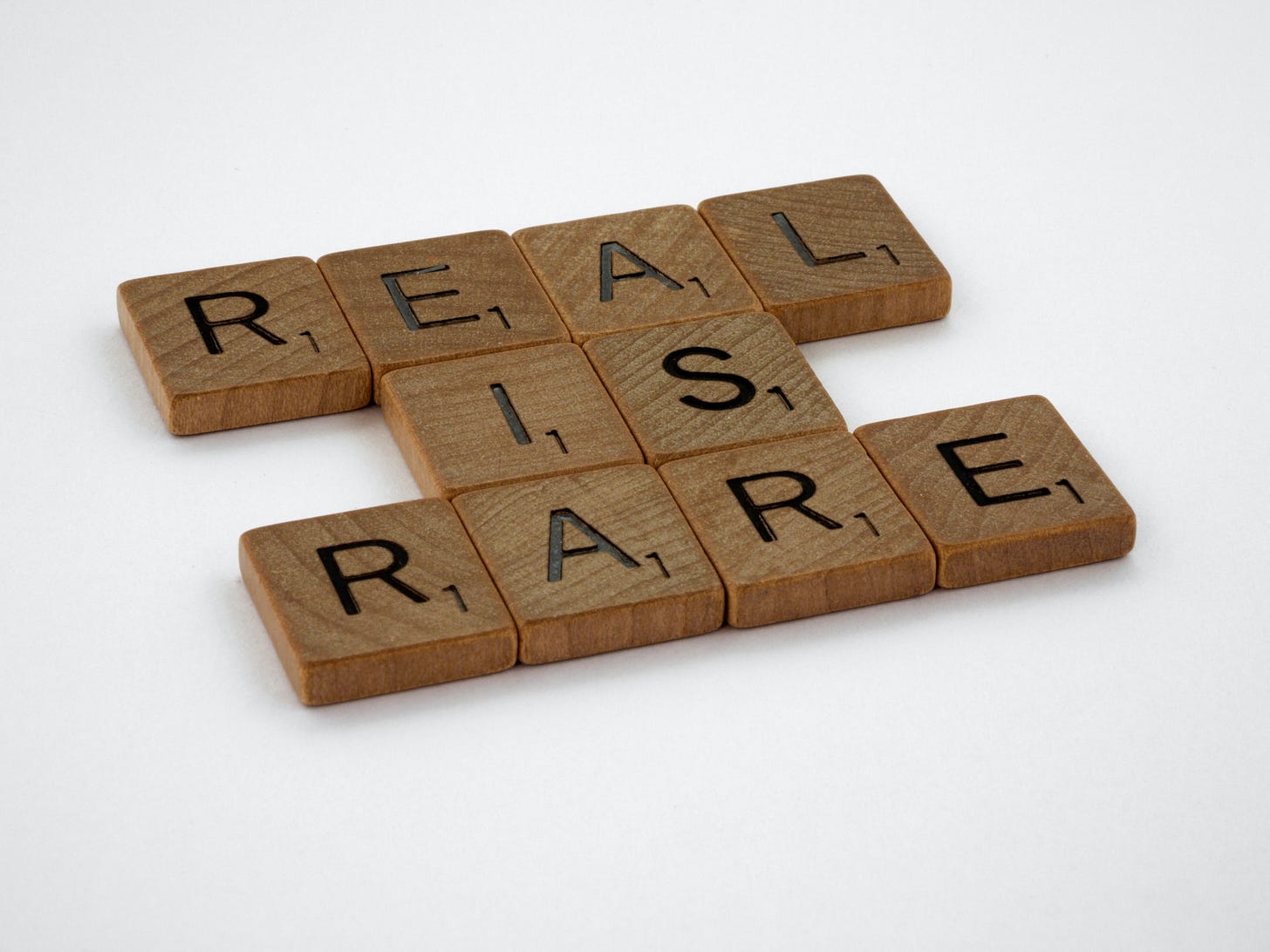In this issue: Effective Authenticity…/ How to Be a Compassionate Manager in a Heartless Organization /3 Tips for Conquering Self-Doubt at Work / The Lighter Side of Authenticity
Effective Authenticity… The Importance of Keeping It "Real," Just Maybe Not Quite So Much
Recently I was told authentic (you know who you are).
It's not the first time.
Ok, I’m just a little bit proud, or else wouldn’t be sharing it…yet I recognize that there’s a fine line between TMI and, keeping it “real” that’s easy to cross.
So, what is authenticity, and what makes it a desirable trait to have (in the right amounts)?
Genos International a leading provider of Emotional Intelligence services, says “authenticity is about openly and effectively expressing oneself, honouring commitments and encouraging this behaviour in others.”
Sounds logical enough.
We should all fully be ourselves, right?
Well, maybe not so much…there’s more to being authentic than just expressing your feelings however and whenever you want.
The critical piece and the part where many of us often misstep is in exactly how much we share, when, and with whom.
An important part of being effectively authentic is understanding who you’re speaking to and being able to also gauge their needs at the moment.
This self-awareness and awareness of others, like authenticity, are core parts of emotional intelligence.
We don’t exist in isolation.
Even the most solitary person is a part of groups and systems, which makes it important that we also take into account the emotions of others (within reason).
This benefits everyone.
If others are unable to hear what you’re sharing, then what’s the point.
By now, you might be thinking, if I can’t be fully me then how can I possibly be authentic?
It’s not that you shouldn’t be yourself, it’s just that it’s important to understand which parts are appropriate according to the context.
For example, I grew up in the Bronx (when it really was “Da Bronx’) and spent my formative years either in the bowling alley or the library (now you can see why authenticity comes somewhat naturally to me :).
As you can imagine, I developed quite a vocabulary of both four-letter and four-syllable (ok, maybe 3) words.
While both are very much part of who I authentically am it’s rare that I use either one.
Understanding the when who and how of things, requires a different component of emotional intelligence, called emotional reasoning,
Emotional reasoning involves the use of feelings, considering your own and others’ when making decisions, and then combining that information with facts, before communicating the outcome with others.
In other words, you need to know when to share and when not to “over-share.’
At its best, authenticity can lead to more meaningful relationships, increased trust, and a deeper sense of connection with others.
In the workplace, it shows up as being honest about specific feelings, such as happiness and frustration, and providing feedback to colleagues about the way you feel -- at the right time, to the right degree, and with the right people.
When effective it’s been shown to improve relationships, increase job satisfaction, and support a more fulfilling work and personal life.
Yes, being effectively authentic can be complicated…but I think you’ll find that it’s worth the effort.
A Few Steps for Being Effectively Authentic:
1. Take the time to write down the way you are thinking and feeling about events at work. Doing so can help you more accurately and articulately express yourself.
2. Consider the time, place, and situation you are in. Being too direct without any considering these factors can result in negative responses from others, including defensiveness, withdrawal, or confrontation.
3. Be open and vulnerable about the way you feel. This will help you connect with others and encourage them to be open and vulnerable with you. It also helps build trust and mutual understanding.
We all have different levels of comfort in terms of what we’re willing to share and part of being authentic is knowing your own boundaries. However, if you’re overly guarded about the way you feel it can lead to mistrust and misunderstandings.
—
RECOMMENDED LISTENS, READS
How to Be a Compassionate Manager in a Heartless Organization
Being a compassionate leader is being a good leader. It can be hard to do that when the rest of the company’s culture seems to rely on favoritism or neglect. What can you do if you want to manage your team with compassion, but your leadership hasn’t bought into this philosophy?
3 Tips for Conquering Self-Doubt at Work
High achievers often worry they aren’t qualified to weigh in. Here’s how to get past those self-sabotaging thoughts.
—
The Lighter Side of Authenticity
—
Are there any other subjects you want me to cover? Have Questions? Or, Need a Coach to Help You Create Your Wild and Precious Life… Hit “Reply” and tell me!
I love hearing from you :)!
—
If you enjoyed this newsletter, please forward to a friend (or 5 :) or someone you feel would benefit from reading it!
—
Andrea J. Miller
+1 (646) 556-5401 (Whatsapp)





